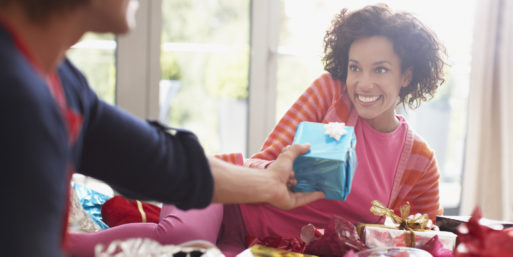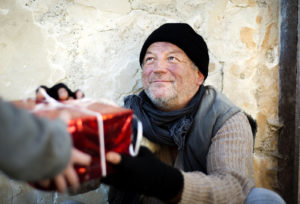
Credit: unilovers.co.uk
Giving gifts at Christmas is a time-honored tradition that dates back several centuries, and is firmly entrenched in most Western cultures today. And while it’s not clear why gift giving became associated with the Christian celebration of Jesus’ birth, it has evolved into a symbol of what we view in our culture as a “Season of Joy.” Despite our almost universal rejection of the Christmas-time commercialism and marketing hype, most of us still buy holiday gifts for the people we love (and sometimes for those we don’t).
And it turns out that there is actually more to the intersection of giving and joy than meets the eye. Research reported in Psychology Today supports the fact that the two are actually biologically intertwined. Specifically, giving stimulates a powerful trio of neurotransmitters — dopamine, serotonin and oxytocin — each of which is associated with improving mood.
And they have many other benefits as well.
Dopamine, for example, plays a role in motivation and arousal. Serotonin helps with sleep, learning and memory and regulating appetite. And oxytocin — one of the most powerful chemicals in the body — reduces blood pressure, decreases social anxiety, and promotes bonding, empathy and trust.
And it’s not just our neurotransmitters that make giving feel good. According to the Time Guide to Happiness, research shows that giving activates the same parts of the brain that are stimulated by sex and food. In fact, a growing body of evidence shows that humans are actually hard-wired to be altruistic and generous and to feel pleasure when we give.
Giving and Anxiety
Giving, or any act of kindness, can also decrease anxiety, according to a study by two Canadian researchers reported in the journal Motivation and Emotion in 2015. The pair, Jennifer Trew of Simon Fraser University and Lynn Alden of the University of British Columbia, looked at how performing acts of kindness affected students afflicted with social anxiety, a severe form of shyness that causes sufferers to avoid social interaction of all kinds.

Credit: ladywimbleton.com
The researchers enrolled a group of 115 undergraduate students who suffered from social anxiety and assigned them to three groups. Over the next four weeks, the first group performed simple acts of kindness for others, such as washing their roommates dishes or mowing a neighbor’s lawn. The second group engaged in normal social interactions (a form of exposure therapy). The third simply recorded their activities each day. (This was the control group.)
At the end of the study period, the researchers found that the participants who had done good deeds were less socially anxious than those in the other two groups. The exposure group also saw a decrease in their anxiety level, although it took longer to achieve and wasn’t as great. The control group showed no change.
Trew and Alden surmised that the reduction in social anxiety in the “acts of kindness” group resulted from the positive effect their generosity had on others, which helped to counteract their fear of rejection and psychological distress. Eventually, they believe, continued acts of generosity could lead students with social anxiety to have more satisfying, happier, and more socially engaged lives.
Obviously, there’s more than a little truth to the old adage, “It’s better to give than to receive.” So, while you’re opening your Christmas presents and enjoying your holiday meals, take a moment to express your love and gratitude one more time. It’s bound to make you feel even better than you already do.

 Why Giving Makes Us Feel Good
Why Giving Makes Us Feel Good



 Are “Rage Rooms” a Healthy Outlet for Grief and Burnout?
Are “Rage Rooms” a Healthy Outlet for Grief and Burnout?
















Really nothing makes us more happy and gives so much satisfaction than giving away to some body who truly needs it, that smile of satisfaction and gratitude is priceless and no amount of riches could buy it.
Report this comment